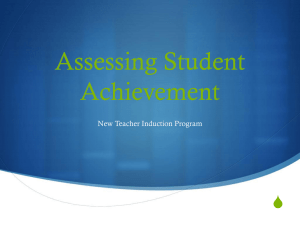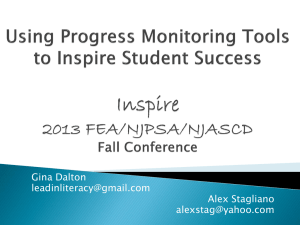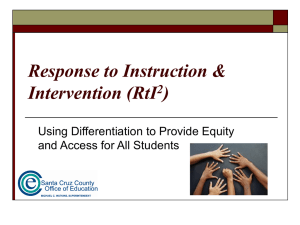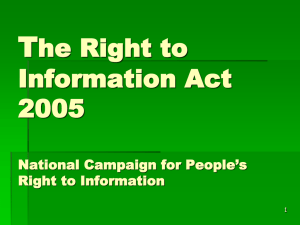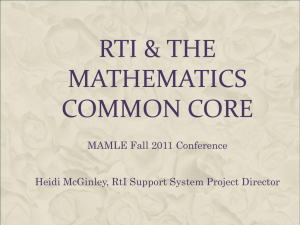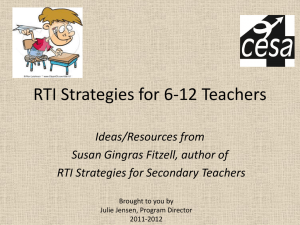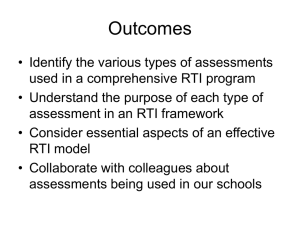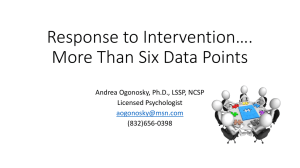Martin County School District - Florida Problem Solving & Response
advertisement
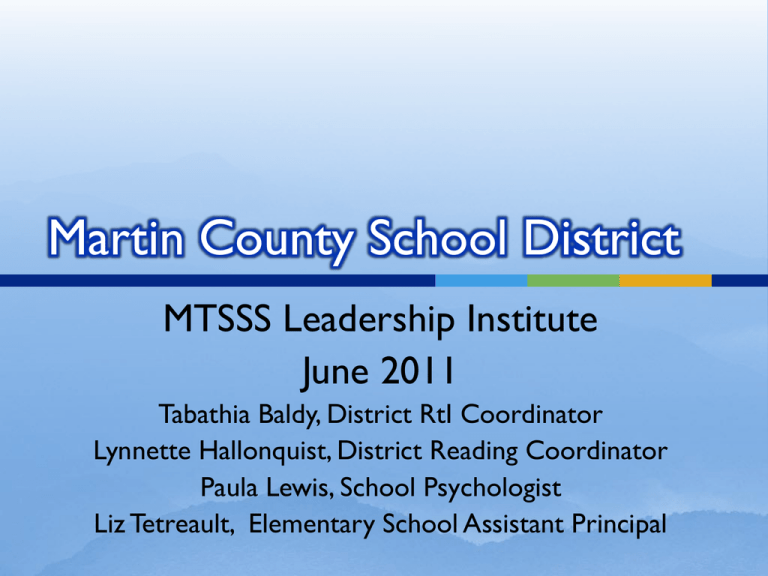
Martin County School District MTSSS Leadership Institute June 2011 Tabathia Baldy, District RtI Coordinator Lynnette Hallonquist, District Reading Coordinator Paula Lewis, School Psychologist Liz Tetreault, Elementary School Assistant Principal Located along the Treasure Coast http://www.insideflorida.com/map/florida-counties-map/ District Demographics Approximately 18,000 Students 11,577 Caucasian 1408 African American 4260 Hispanic 53 Indian 289 Asian 406 Multi-Racial 7 Pacific Islander Demographics 2% 2% Caucasian 24% African American Hispanic 8% Multi-Racial 64% Asian Demographics Continued 41% of students are Economically Disadvantaged 13% of students are English Language Learners 16% of students are Students with Disabilities Martin County Schools 3 High Schools 5 Middle Schools 12 Elementary Schools 2 Charter Schools 4 Special Program Sites Department of Juvenile Justice Site Residential Hospital Setting Alternative Education Setting Separate Day School (ESE) District Organizational Chart Superintendent of Schools Executive Director of Instructional Services Executive Director of Human Resources and Professional Development Executive Director of Exceptional Students Education Assistant Superintendent for Leadership and Development Organizational Chart (continued) Executive Director of Instructional Services Director of Elementary Programs & School Improvement Response to Intervention Coordinator Reading & Language Arts Coordinator PS/RtI Coaches Reading Coaches Director of Adult, Secondary and Virtual Education Programs Math Coordinator Science Coordinator Assessment & Accountability Coordinator Why Instructional Services? A paradigm shift is needed In order for stakeholders to realize PS/RtI is not simply a “track” to ESE, they must see it as a General Education Initiative designed to ensure ALL students receive the support they need to meet expectations. We want to send a clear message that PS/RtI is not about placing a student, it is about effective instruction for all. Funding Sources 2009/2010 – ARRA 2010/2011 – ARRA & CEIS 2011/2012 – CEIS Rationale for Implementation Our goal is to provide all students effective & appropriate instruction/intervention in a more timely manner using both historical and real time data. We hope to implement a streamlined system in which students are matched to an intervention which provides them with the level of intensity and duration necessary for them to accelerate their learning to achieve benchmark expectations. We hope that individuals and teams of personnel use the problem solving process to identify appropriate instruction for all students. Our Mission The mission of the Martin County School District, in partnership with family and community, is to equip students with the skills and knowledge necessary to become responsible citizens through comprehensive learning experiences and innovative environments that extend beyond traditional walls. Implementation of RtI allows schools in Martin County to develop a framework for supporting the unique academic and behavioral needs of all students. It encourages instructional and support staff to collaborate on best instructional practices. District Expectations It is the district expectation that ALL schools will use the problem solving process when developing their school improvement plans and reflect on how students are responding to instruction/interventions to inform their instructional decisions at an individual, classroom and school wide level. Development & Structure Spring 2009 - Martin County formed a District PS/RtI Leadership Team which met periodically to develop our district RtI plan. Membership included the Assistant Superintendent, Executive Director of Instructional Services, Executive Director of Exceptional Student Education, Director of School Improvement, Reading and Math Curriculum Coordinators, School Psychologist, Behavior Analyst, teacher union representation, and others as interested participate in the process. The plan was structured using the “Response to Intervention Blueprints: District Level Edition”, NASDSE. Current District Based Leadership/Problem Solving Team Current Implementation Status Martin County is at full implementation status. All 12 Elementary Schools All 5 Middle Schools All 3 High Schools All School Based Leadership/Problem Solving Teams have received training in PS/RtI and either have a coach assigned to their school or can request one as needed… However, levels of implementation vary across schools. Integration of RtI: A & B The School Based PS/RtI Team problem solves around ANY student in need of intervention, regardless of the need being academic or behavioral. Teams are fluid. Academic and behavioral specialists will participate in problem solving process depending on identified need. Many PS/RtI team members are also PBIS team members. We would like to move forward in blending these teams into one fluid team. Integration of RtI: A & B Our goal is to always look at the “Whole Child” when problem solving. Integration of RtI: A & B School level teams are progressing faster than district level teams to integrate PS/RtI & PBIS. Instructional Services Exceptional Students Education PS/RtI PBIS PS/RtI Supports District Team provides Professional Development for all School Based Leadership/Problem Solving Teams. RtI Coaches support School Based Leadership/Problem Solving Teams, classroom teachers, and students on a daily basis. RtI Coordinator continuously arranges additional effective Professional Development. PS/RtI Supports High Quality Progress Monitoring & Intervention Materials have been purchased. Will be used in the future as well High Quality Professional Development has been provided on how to effectively use these materials. Coaches attend trainings alongside teachers to provide continuous support and coaching . Teaming is often used as a system of supports. PS/RtI Supports Coaches and Coordinator formally meet each month to problem solve and reflect on implementation. Coaches give insight to the district coordinator about the actual implementation level of each school site. RtI Bulletin During Year 1 implementation, the RtI Coordinator would send out a bulletin periodically to address reoccurring concerns & to build a common language. PS/RtI Supports Collaboration is key School Psychologists ESE Specialists Reading, Writing, & Math Coaches Behavior Specialists Guidance Counselors Administrators Teachers Parents Outside Agencies PS/RtI Coaches Act as liaisons between SBLT & District Facilitate the Problem Solving Process at the school level Provide consistent coaching and modeling for teachers Analyze academic and behavioral data Conduct non-threatening observations and provide timely feedback and suggestions RtI Coaches Display student responses to instruction/intervention graphically for SBLT team Maintain accurate records of all students receiving interventions and their responses Consult with & support teachers in identifying appropriate interventions Are a consistent presence at the schools School Based PS/RtI Teams Facilitator Administrator Parent Instructional Support Classroom Teacher Data Coach Recorder Time Keeper Principal Assistant Principal RtI Coach Reading Coach Writing Coach School Psychologist Guidance Counselor Behavior Specialist Math Specialist ESE Teacher/Team Leader Parent Liaison Classroom Teacher(s) SBLT Organizational Structure Each school has a set day, time, & place for PS/RtI Meetings (e.g. Tuesdays @ 2:20 in the conference room) Usually when the School Psychologist is available This works best when administration ensures this time remains “sacred,” and does not allow for other events to be scheduled during this time. It becomes part of the school’s organizational structure. Of course, many teams need to meet in addition to these regularly scheduled times. Ensuring fidelity of the process? Coaches facilitate most meetings A common language is encouraged Avoid admiring the problem Paperwork & Procedures follow the 4 steps of Problem Solving and guide teams Form #194 (academic interventions & SOME behavioral interventions) Form #196 (behavioral interventions when an FBA/BIP is needed) Form # 194 Available on Outlook Forms to any district employee Schools have copies available in specified location Used to problem solve around academic concerns and behavioral concerns that do not require an FBA/BIP Page 1: Summary of Concerns Page 2: Gap Analysis Page 3: Problem Identification & Analysis Page 4: Intervention Design Page 5: Response to Intervention Page 6: Signatures & Parent Contact Form # 196 Available on Outlook Forms to any district employee Used to problem solve around behaviors that require intensive intervention Aligns a Functional Behavior Analysis/Behavior Intervention Plan (FBA/BIP) with the Problem Solving Process Adapted from the ERASE form (PBIS) Page 1: Problem Identification Page 2: Problem Analysis (FBA) Page 3: Intervention Design (BIP) Page 4: Intervention Design (BIP) (continued) Page 5: Response to Intervention Facilitators of Success Unwavering Support from District Superintendent, Assistant Superintendent & Directors Size of District Not too big, not too small Allows for infrastructure conducive to implementation Allows for relationships to be built among school level & district level staff Facilitators of Success (continued) ARRA funds Purchase of high quality intervention materials as well as PD for implementation Salaries for personnel to facilitate implementation Allowed for layers of Professional Development based on need and target audience teachers, support staff, administrators, etc. Facilitators of Success Internal coaches to support schools on a consistent basis Effective and ongoing Professional Development People with open minds ready to embrace a true paradigm shift Department of Education Monitoring Visit Opportunity to reflect on our practices & identify strengths and needs Continuous support from USF/RtI Project Facilitators of Success Administrators who are active participants in the Problem Solving Process & set the expectation for all teachers to be active participants as well Collaboration at the school level for streamlining initiatives Conducting “Planning for Next Year Meetings” Ensures students in need receive interventions from day one Emphasizes the importance of using careful thought when placing students for next school year Barriers to Success Lack of true understanding by Key Stakeholders More opportunities for learning for all stakeholders are needed Old procedures still exist that prohibit true paradigm shifts from occurring All departments should reassess & reflect on all policies, procedures, and practices yearly Barriers to Success Overcoming the mindset of “A label = Help” Poorly designed interventions lead to poor responses This leads to a lack of buy-in Over or Under Problem Solving A balance is needed Barriers to Success Lack of collaboration among some district level teams “Us vs. Them” mentality Professional conversations must happen We must be willing to step out of our comfort zones and truly assess where we are and where we need to be Barriers to Success Loss of ARRA Funds We must be creative with funding Continue to conduct needs assessments to determine where funds are best utilized We are addressing… And monitoring the progress of: Leadership K-12 Alignment Coaching Evaluation/Accountability Data-Based Problem Solving/Data Systems Sustainability Our goal is to always reflect on our progress and look for means of improvement. Leadership Elementary School Based Leadership PS/RtI Teams High School Based Leadership PS/RtI Teams District Leadership PS/RtI Team Middle School Based Leadership PS/RtI Teams Leadership PS/RtI Coordinator & PS/RtI Coaches Sends the message that “this is important” and “you have support” Relationships are built Administrators can contact the coordinator or any coach at anytime Curriculum Coordinators often integrate RtI into their Professional Development Consistent message is shared K-12 Alignment Added Secondary PS/RtI Coaches this school year Elementary and Secondary Coaches will communicate needs of transitioning students & monitor their progress. A Secondary PS/RtI Team/Cohort has been established. Schools have shown interest in further development (e.g. participation in pilot programs). Coaching PS/RtI Coaches are highly trained in the problem solving process, literacy, content areas, and behavior. Coaches work as a team and arrange schedules to meet needs of all schools. Coaches collaborate with PBIS, Literacy, and Content Area Coaches to streamline initiatives. Coaching Each School has an RtI Coach assigned 2010/2011 (9 Coaches) 1 High School Coach (3 schools) 2 Middle School Coaches (5 schools) 6 Elementary School Coaches (12 schools) 2011/2012 Budget allows for 5 coaches Even though the presence of a coach will be less, it is important to remain a presence in each school on a weekly basis Data Based Problem Solving/Data Systems Performance Matters Online data base FCAT scores (3-12th grade) District Benchmark Test Scores (3rd – 12th Grade) Reading, Math, Science Allows for item analysis per benchmark on FCAT & District Benchmark Assessments (3rd – 12th Grade) Allows for sorting by AYP subgroup, gender, grade, grade level, teacher, et c. Recently added FAIR Data from PMRN (K-12) and attendance data Data Based Problem Solving/Data Systems SWIS (School -Wide Information System) Behavioral Data Moving to RtI:B database for 2011/2012 PMRN (Progress Monitoring & Reporting Network) FAIR data TERMS (attendance, suspensions, CEIS reporting) Pinnacle (grades, attendance) Includes “Parent Viewer” Data Based Problem Solving/Data Systems Online Data Management Systems for Progress Monitoring of Reading Fountas & Pinnell Benchmark Assessment System Fountas & Pinnell Leveled Literacy Intervention Evaluation/Accountability All school based teams were encouraged to use the SAPSI. 6 Elementary Schools participated 3 Middle Schools participated Professional Development is provided on an ongoing basis in schools by PS/RtI Coaches & for SBLT’s by District Team. Collaboration among coordinators to streamline PD as needed Evaluation/Accountability Each coach maintains an intervention log for each school they serve. Excel document allows for sorting by grade, gender, ethnicity, teacher, AYP subgroup, intervention, previous retentions, attendance issues, meeting dates, et c. Evaluation/Accountability: Outcomes More students are receiving interventions in a more timely manner. Attendance rates have increased. Retentions have decreased. Initial Referrals for Comprehensive Evaluations have decreased. Students are responding positively to the majority of interventions. Number of Elementary Students Who Have Received Interventions during the 2010/2011 School Year 1200 1067 1080 982 1000 909 731 800 592 646 600 413 400 200 125 0 By Sep 30 By Oct 31 By Nov 30 By Dec 31 By Jan 31 By Feb 28 By Mar 31 By Apr 30 By May 31 Martin County School District Attendance 160 Day Comparison Percentage of Students Maintaining at or above 90% Attendance Rate Percentages Include Excused and Unexcused Absences 94.0% 93.7% 93.9% 92.9% 92.5% 93.0% 92.0% 90.5% 90.3% 91.0% 90.0% 2009SY 88.9% 2010SY 89.0% 87.7% 88.0% 87.6% 87.0% 86.0% 85.0% 84.0% Elementary Schools Middle Schools High Schools 2011SY 22% Reduction in Retentions from 2008/2009 to 2009/2010 Number of Retentions in Martin County 400 365 350 284 300 250 200 150 100 50 Data Not Available 0 2008/2009 2009/2010 2010/2011 3 Year Comparison of Elementary School Referral Rates 400 390 350 300 250 74% Reduction from 08/09 200 150 101 70% Reduction from 08/09 117 100 50 0 2008/2009 2009/2010 2010/2011 Number of Students Referred for Evaluation 90% of 2010/2011 Elementary School Interventions were Effective 117 (10%) Number of Students Who Received Interventions Number of Students Referred for Comprehensive Evaluations (90%) 1080 Sustainability Compliance vs. Culture Although we are at full implementation status, we are not positive that it would continue without the supports we currently have in place. If we know change takes a minimum of 3 – 5 years to take effect, why would we stop providing support after only 2 years? We have made so much progress... http://dailykarate.wordpress.com/2009/05/14/hitting-a-plateau/ But have a lot of work ahead… http://dailykarate.wordpress.com/2009/05/14/hitting-a-plateau/ Sustainability We believe the key to sustainability is support. We are striving to keep coaches in schools so that administrators and teachers are supported in their efforts to implement PS/RtI with integrity and fidelity. We are striving to continue providing high quality Professional Development, not just on Problem Solving, but also on how to improve effective instruction for all students. Sustainability Our goal is NOT to maintain our current level of implementation. Our goal is to IMPROVE upon our current level of implementation. We must continue to build capacity at the school level so that their ability to Problem Solve can continue to evolve, even with the decrease in the presence of coaches. Planning for Sustainability… Personnel 15 % of IDEA Grant will be used for CEIS 15% CEIS SWD 85% Coordinator & 5 Coaches Professional Development Intervention Materials Social-Emotional & Behavioral Support Moving Forward Provide more opportunities for learning for all stakeholders Move from just “Parent Involvement” to a true understanding by all parents Build relationships across departments to ensure collaboration at the district level Encourage all schools to use Problem Solving in all areas Moving Forward Begin to have difficult conversations in a professional manner Begin problem solving systemically Create a balance between over problem solving and under problem solving Become more proactive in celebrating successes publicly Questions?
